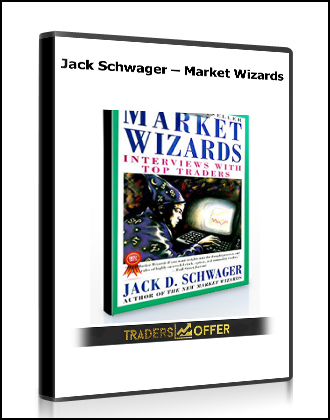
Jack Schwager – Market Wizards
Price: $25
Please contact us: – Email: Tradersoffer@gmail -Skype: [email protected]
A bestselling classic (more than 200,000 copies sold in hardcover and paperback) that delves into the minds of some of the world’s most successful traders.
More than twenty years have passed since the first edition of this book was released. Is it as relevant today as it was then?
Absolutely. Markets may change and the specific techniques or systems that work best may change, but the underlying core principles that lead to trading success stay the same. And there is a good reason for that. Through all periods, market price moves reflect some combination of underlying fundamentals and human behavior. Since human nature doesn’t change, the market’s basic behavioral patterns don’t change either. I believe that every conclusion I reached about the factors important to trading success in the first edition remains equally valid today. Perhaps the best testament to the continued relevance of
Market Wizards in today’s markets is that so many of the managers I meet who read the original edition early in their careers make it required reading for new traders in their organization.
Has trading fundamentally changed with the rise of the quants and algorithmic traders?
The growing role of algorithmic trading may have eliminated some market inefficiencies as sources of profitable strategies, and it may even have impacted the efficacy of some trading systems, but I don’t believe it has changed fundamental market behavior. The same basic concepts that are critical to trading success remain as valid now as they were a generation ago when computerized trading was in its infancy.
What are these basic concepts?
Well that’s what this book is all about. But to offer one example, I believe that developing a trading methodology that fits your personality, as opposed to seeking someone else’s approach, is an absolutely critical element to succeeding as a trader.
Why do most traders fail?
There are many reasons. They seek easy answers. They listen to “experts” and chase trading fads instead of doing the hard work of developing their own methodology. They focus almost all their energy on determining trade entry points and all but ignore the more critical questions of trade exit and risk management. They listen to other people. These are a few of the reasons. Readers will find a lot more in the book.
Which trader interview in the book has been the most popular?
Readers will often tell me that a certain chapter was their favorite and by far the most important in improving their own trading. The interesting thing is that they always seem to mention a different trader. There is no consensus. Different readers will find different things in the book important. They will relate to different traders. It all goes back to the importance of finding your own approach in the market.
Have the interviews you did for Market Wizards been important to your own trading?
The interview and writing process has helped solidify in my own mind the principles that are important to trading success. At times, it has also had a very specific influence. A great example occurred last summer. At the time, the stock market was approaching the high end of a long-term trading range, and for a variety of reasons, I expected the rally to fail and was positioned on the short side of stock index futures. Then the government released an extremely bearish employment report. It was so negative that commentators couldn’t even cite one offsetting bullish consideration, as they usually do. The market initially sold off sharply in response–“perfect,” I thought of my trade–but by the end of the day, it nearly recovered the entire loss, ending the week near the recent high. From the perspective of a short, this was terrible price action. I thought I was in trouble. I was prepared to cover most of my position when the market opened on Sunday night. On Sunday night, however, the market opened lower. I immediately thought of Marty Schwartz’s advice in this book: “If you’re very nervous about a position overnight, and especially over the weekend, and you’re able to get out at a much better price than you thought when the market trades, you’re usually better off staying with the position.” I did, and Schwartz’s insight saved me a lot of money, as the market proceeded to move sharply lower in the ensuing weeks.
